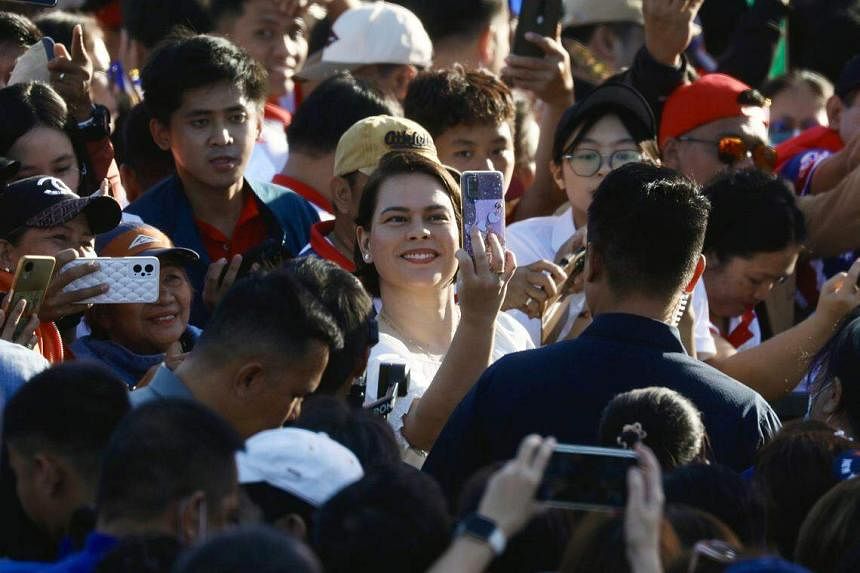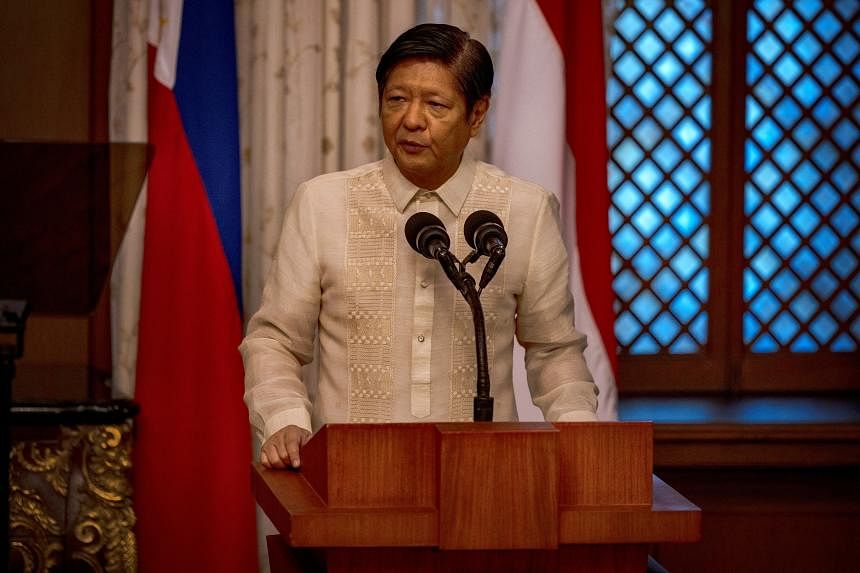MANILA – The alliance between Philippine President Ferdinand Marcos Jr and his predecessor Rodrigo Duterte disintegrated this week when they accused each other of using drugs – a rift that could threaten Mr Marcos’ reform agenda and risk fuelling instability.
The alliance between two of the Philippines’ most influential families that swept Mr Marcos and Mr Duterte’s daughter Sara into power in 2022 was always expected to collapse, but analysts are surprised by how soon the gloves have come off.
“This is a point of no return,” said political science professor Jean Encinas-Franco of the University of the Philippines, pointing to the ferocity of the exchanges between the two families.
Mr Sebastian Duterte, the former president’s son and mayor of Davao city, has called on Mr Marcos to resign over flawed policies such as his pro-US foreign policy, which he said “endangers the lives of innocent Filipinos”.
“The opportunistic political alliance was not meant to last,” said Mr Temario Rivera, chairman of the Centre for People Empowerment in Governance think-tank.
“The break seems to be taking place rather early.”
Mr Marcos was quick to play down the tensions, saying on Jan 30 that the coalition was intact. “It is still working,” he said, adding that he was keeping Ms Duterte as education minister.
Mr Marcos’ office did not respond to a request for comment. There was no immediate response from the Dutertes.
Analysts said the rift could now threaten Mr Marcos’ ambitious plans to grow the economy, create jobs, overhaul infrastructure and strengthen the armed forces.
“A breakdown of the formal alliance risks fomenting new divisions within the military, proving serious problems of governance and stability,” said Mr Rivera.
Swept to power
The Marcos and Duterte families joined forces in 2022 with Ms Duterte standing as Mr Marcos’ vice-presidential running mate, allowing him to tap the Dutertes’ huge support base and seal a comeback for the disgraced Marcos dynasty.
The late Ferdinand Marcos Sr was president for two decades, ruling as an authoritarian before he was ousted in the 1986 “people power” uprising. He and his wife Imelda were accused of amassing more than US$10 billion (S$13.4 billion) while he was in office.
But cracks in the Marcos-Duterte relationship emerged early.
Mr Marcos reversed Mr Rodrigo Duterte’s pro-China stance and pivoted back to the United States, granting Washington greater access to Philippine bases amid China’s assertiveness in the South China Sea and near Taiwan.
Mr Marcos brought to the fore a 2016 arbitral ruling fortifying Manila’s territorial claims in the South China Sea, which Mr Duterte had largely set aside in a move seen as directed at China, which has overlapping sovereignty claims in the South China Sea.
Mr Marcos also sought to revive peace negotiations with communist rebels, which his predecessor had scrapped, and which Ms Duterte has described as an “agreement with the devil”.
A major blow to the relationship came in November 2023 when Mr Marcos said he was considering the Philippines rejoining the International Criminal Court. Mr Duterte had withdrawn membership in 2018 after the court’s prosecutor announced a preliminary examination into thousands of killings in his war on drugs.
An investigation into that internationally rebuked war on drugs is under way at the Hague-based tribunal.
Mr Marcos has thrown his support behind moves to change the 1987 Constitution, saying it would ease regulations for business and lure investors, but Mr Duterte has accused him of using constitutional change to stay in power.
Opponents of constitutional change say it aims to change the political system and remove term limits, including that of the president, who can currently serve just one six-year term.
Mr Duterte has warned that Mr Marcos might suffer the same fate as Mr Marcos’ father – who had to flee the country – if he insisted on amending the Constitution introduced after the 1986 revolution.
‘Open warfare’
The alliance publicly disintegrated on Jan 28 when Mr Duterte called Mr Marcos a “drug addict” during a rally against moves to change the charter. The rally was attended by Ms Duterte.

Mr Marcos hit back, saying Mr Duterte’s fentanyl use, which the former leader admitted to in the past for pain relief, could have clouded his judgment.
Analysts said the public bust-up could be linked to the 2028 presidential race, which Ms Duterte is expected to contest and in which she stands a strong chance. A 2023 survey by pollster Social Weather Stations showed she was the top pick for president in 2028.
“It will be an open warfare this year,” said Mr Ronald Llamas, a veteran political analyst and former presidential adviser.
The Philippines will hold midterm elections in 2025 to choose half the Senate and elect congressmen and local officials.
If the candidates Mr Marcos endorses lose the midterms, or his supporters shift loyalties, his legislative agenda could be in peril, said analysts. REUTERS

